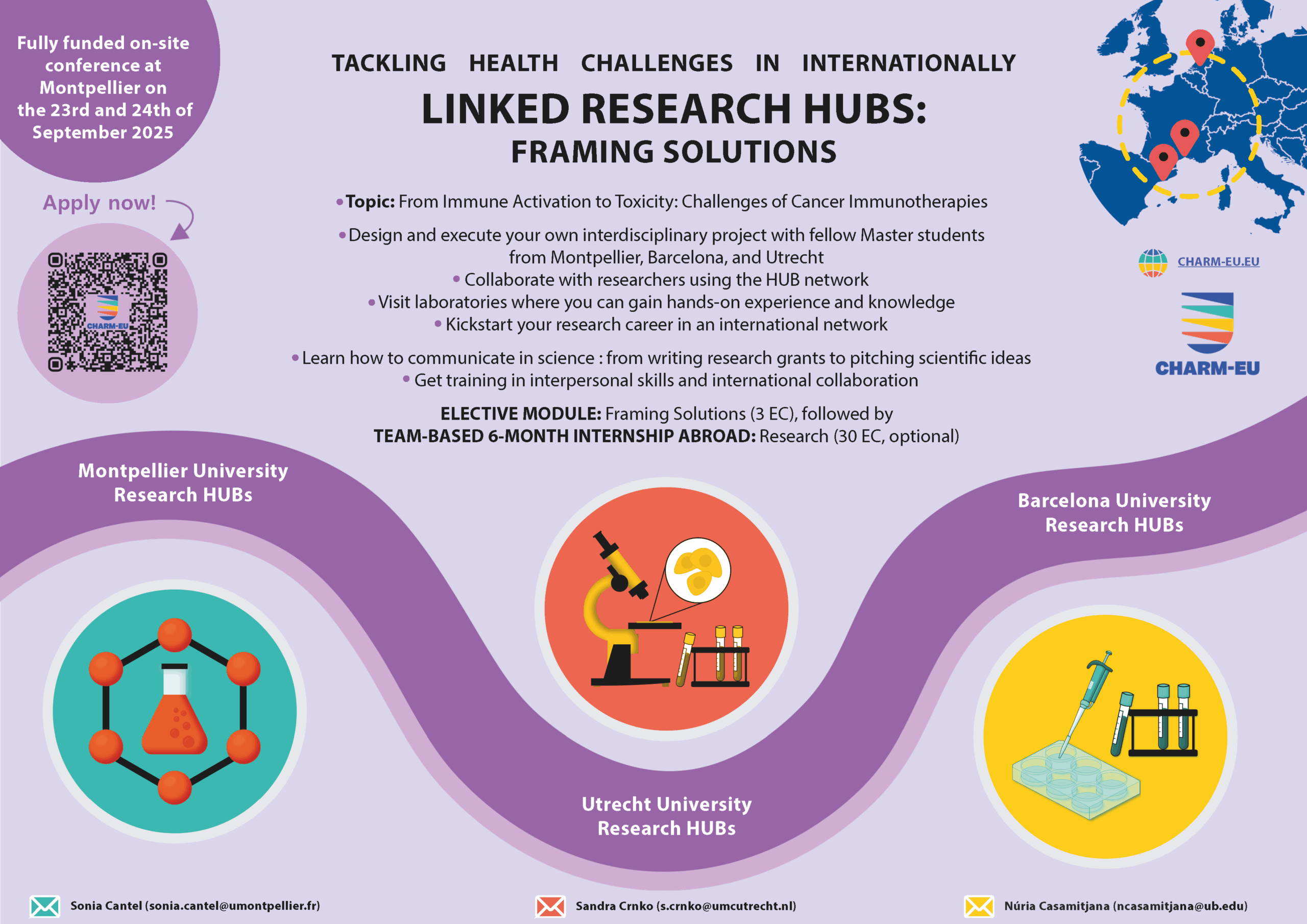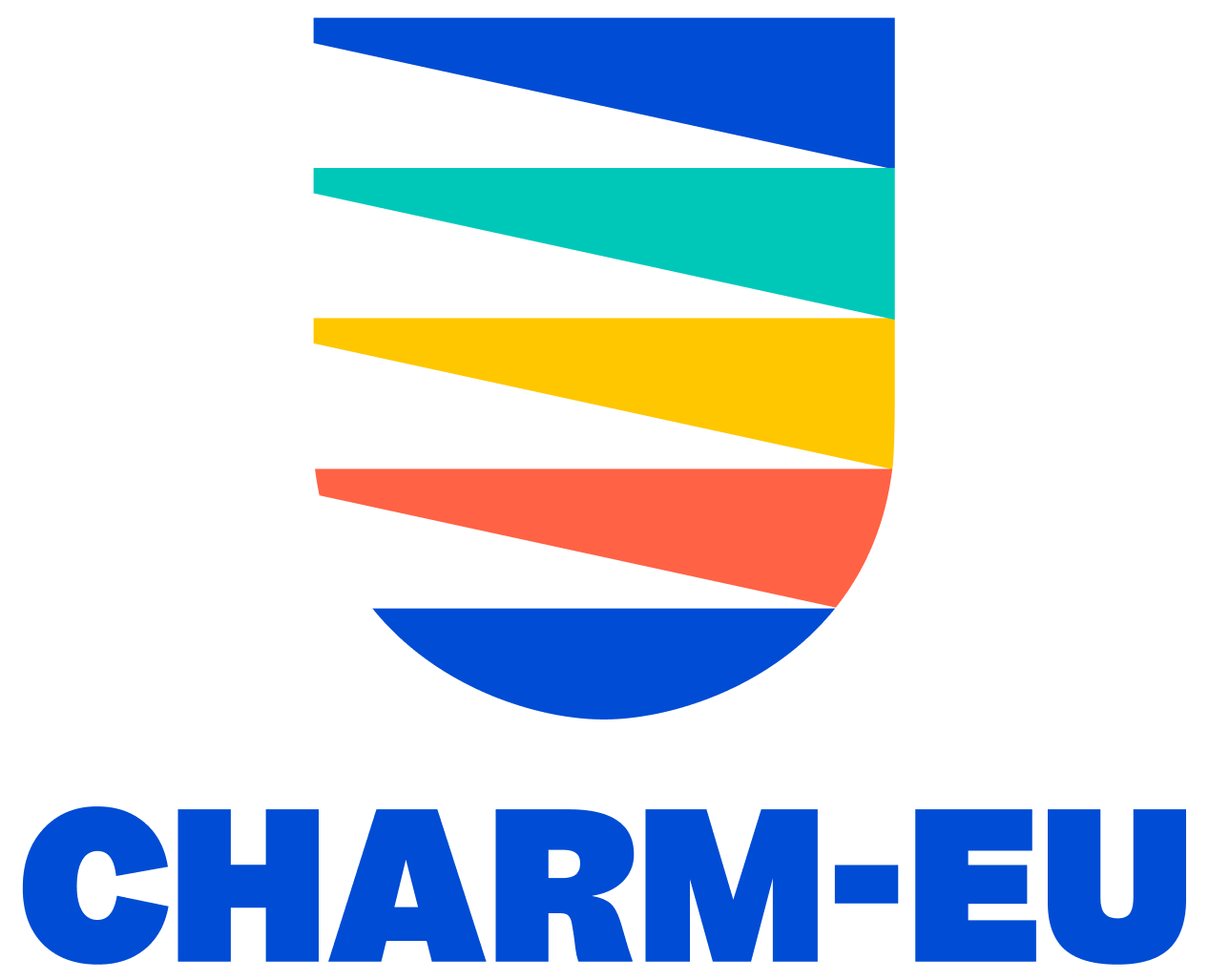Elective module: research hubs in Utrecht, Montpellier & Barcelona

The 2025 edition of the elective module “Tackling health challenges in internationally linked research hubs” has already started with Master students from Université de Montpellier, Universitat de Barcelona and Utrecht University. This year’s theme is: “From Immune Activation to Toxicity: Challenges of Cancer Immunotherapies.”
Université de Montpellier, Universitat de Barcelona and Utrecht University collaborate on this elective module consisting of two parts:
Module: ‘Tackling health challenges in internationally linked research hubs: Framing solutions’ (Sept – Dec 2025)
A part time module in which students prepare interdisciplinary research by writing a proposal for a Europeans Research Call (ERC) starting grant.
The module is hybrid between Utrecht, Barcelona and Montpellier.
The conference to kick off the module is on the 23rd and 24th September 2025.
Internship: 6 positions on ‘Tackling health challenges in internationally linked research hubs: Research’ (Jan – June 2026)
A fulltime internship of 3 (UB students) or 6 months (+/- 30 ECTS, UU and UM students), in which students do hands-on lab research. The internship takes place in 3 hubs in Utrecht, 2 hubs in Montpellier, and in 2 hubs Barcelona. Interns will collaborate on researching the same overarching topic each from their own perspective. There are six internship spots: 2 in UU, 2 in UM and, 2 in UB
- Two Positions at University Medical Centre Utrecht
Supervisors: Niels Bovenschen (Biomedicine Student Research HUB), Rene van Nostrum (Nanomedicine Engineering Student Research HUB), Sabrina Oliveira (Biotechnology Student Research HUB)
- Two Positions at Institute Biomolecules Max Mousseron (IBMM): Information internship in chemistry of biomaterials & internship in chemical biology strategy for protein targeting.
Supervisors: Sonia Cantel (Peptide Engineering and Protein Targeting Student Research HUB), Cécile Echalier (Peptide-Based Polymers and Materials Student Research HUB), Catherine Teyssier (The Biology and Cancer Student Research HUB).
- One position at the Research Institute in Cancerology of Montpellier (IRCM)
- UB positions TBD
Critical thinking, problem solving, communication, and collaboration skills are vital for professionals to tackle complex health challenges.
Training these skills can be achieved through interdisciplinary projects where students research, prototype, and collaborate.
The linked research HUBs provide an innovative international educational platform for Master students to work together on translational medicine challenges.
Module learning outcomes
Tackling health challenges in internationally linked research hubs: Framing solutions
The elective Master’s course offered jointly by University of Montpellier, University of Barcelona and Utrecht University fosters an international network of research hubs dedicated to addressing global health challenges with a student-centric approach. Emphasizing the cultivation of transversal skills essential for effective research, the course aims to equip students with the tools necessary to excel as researchers and prepare them for future internships and career opportunities. Students engage in interdisciplinary teamwork focused on a real-world health challenge, with the theme for the 2025/26 edition being “Immunotherapies Tackling Cancer and Autoimmune diseases”. This theme evolves annually to address current issues. Collaborating across partner universities, students form subgroups representing diverse disciplinary backgrounds to devise hypotheses and draft research proposals aimed at addressing the chosen challenge. A hybrid or on-site conference at University of Montpellier is organized at the beginning of the course with representatives of various aspects of the chosen topic—including patients, patient advocacy groups, medical professionals, and researchers—who provide insights from their respective perspectives. Throughout the module, students participate in (hybrid) plenary workshops, skill-development lectures, and collaborative work sessions led by principal investigators from the research hubs. The culmination of the course involves the collaborative production of a written research proposal and presentation, which students pitch at the conclusion. Selected students who have participated in the course may also have the opportunity to undertake a six-month (three-month for UB students) unit internship starting in January 2026. After completing the module, students will be able to:
- Collaborate with stakeholders from different domains, disciplines, and social groups, including scientists, medical specialists, patients, society, industry, and policymakers, to design solutions to health challenges in a transdisciplinary manner.
- Develop and translate cross-sectoral, context-specific strategies/interventions within the continuum of fundamental science to pharmaceutical industry, policymaking, and social, economic, cultural, and environmental determinants of health problems.
- Demonstrate comprehensive and critical awareness of health challenges and their interconnections with One Health and Environmental & Planetary Health, including ethical approaches, personalized disease management, and societal needs.
- Formulate hypotheses based on current literature and cutting-edge data, identify appropriate methodologies, and communicate proposals to stakeholders and society in both written and oral formats.
- Analyse the principles of evidence-based translational medicine, including its application from bench to bedside and society, and vice versa.
- Summarize the key concepts and theories of the study subject, including the pathophysiology, prevention, diagnosis, treatment, and management of both communicable and non-communicable diseases with high disease burden and mortality, as well as their associated risk factors.
- Reflect on your own personal development, and potential cognitive biases and assumptions in the context of interdisciplinary and international work.
Internship learning outcomes
Tackling health challenges in internationally linked research hubs: Research
On successful completion of the internship students should be able to:
- Work full-time for 3 (UB students) or 6 months (UU and UM students) on a relevant research question or patient case originating from the elective module of this course in which patients are also often involved.
- In subgroups, work together with a group of students on the same overall hypothesis using different perspectives and methodologies.
- Study the subject under the supervision of medical doctors and researchers and devise the research strategy.
- Conduct experiments to answer the research question.
- Analyse and present the data and collectively write a single scientific article or report about it.
Six students can take part in the internship (+/- 30 ECTS). There will be an exchange between Montpellier, Barcelona and Utrecht during the internship and students collaborate on the same challenge in six different internships.
Requirements
Module: Framing solutions
The module requires a sufficient level in English speaking and writing, to facilitate the international collaboration. The lectures will be in English and the research proposal will be written in English. A mobility from UU and UB to UM will be a part of this module.
The module is open for students from:
- UM: students from the following master programs: Science du medicament, Biologie santé (cancer biology/others), Pharmacie Industrielle, Master biomolecule, Material for health
- UU: Graduate School of Life Sciences Master programs including Cancer, Stem Cells and Developmental Biology, Cardiovascular Health and Disease, Drug Innovation, and Molecular and Cellular Life Sciences
- UB
Internship: Research
Six students can take part in the internship (+/- 30 ECTS). An interest in interdisciplinary and international collaboration is important. The requirements for application are given under ‘how to apply?’
How to apply?
Module: Framing solutions
Please include in the application:
- Name
- Email address
- Your current MSc programme
- Short motivation on why you want to join the module (max. 150 words)
The deadline for applying for the internships in Utrecht is 1st of September 2025.
Internship: Research
Nanomedicines mimicking cancer immunity against brain cancer
Please include in your application:
- Name
- Email address
- Current MSc programme, including completed ECTS
- Specify which internship you’re applying for
- Motivation letter of max 600 words.
- Your application for the DRY part (it is required to participate in the 3ECTS module as a preparation for this internship).
For more information and sending in your application, you can contact the module coordinators.
- UM students: sonia.cantel@umontpellier.fr
- UU students: s.crnko@umcutrecht.nl
- UB students: ncasamitjana@ub.edu
Questions about housing or mobility
If you have any questions regarding housing or mobility, please contact your local international office:
- UU students: international office UMCU
- UM students: international office UM
- UB students: TBD
Schedule
Time schedule module
The module will start the 17th of September and end on the 3rd of December 2025.
- 17th of September (13.30 – 17:30CET): Online kick-off meeting
- 23rd of September (13.00-17.30 CET): Conference in Montpellier (on-site)
- 24th of September (9.00-17.00 CET): Conference in Montpellier (on-site)
- 1st of October (13.30-16.30 CET): Start to work together – Workshop on scientific writing
- 15th of October (13.30-16.30 CET): Flexible Lab tours on research methodologies
- 5th of November (13.00-17.00 CET): Workshop on scientific communication
- 19th of November (13.30-16.30 CET): Finalize the proposal and pitch
- 3rd of December (9:00-13:00 CET): Grande Finale – pitch your proposals
In the weeks between the workshops, students will have self-organised team meetings.
Time schedule internship
The internship will take place from January/February – June/July 2026.
